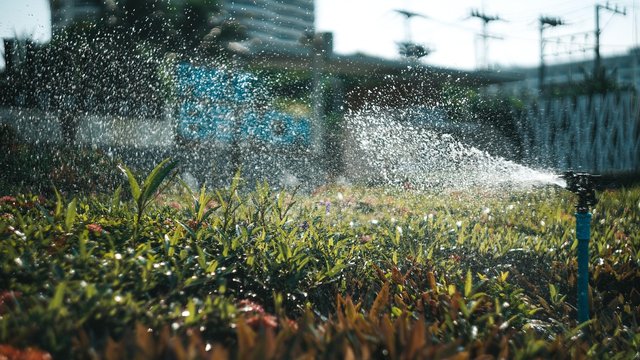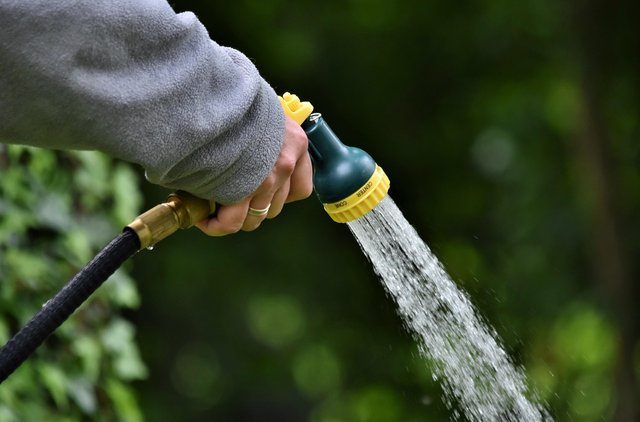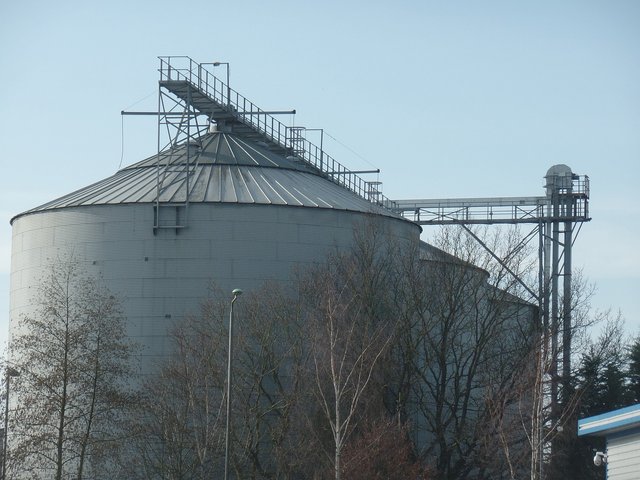Contest : Water sources and uses in agriculture
We know that water is life, and when it comes to farming, water is not just life, it is also survival, productivity, and even prosperity. In Nigeria, we commonly say "Rain is a blessing," and that's true, but during this era of climate change depending on this is risky, with its advantages and disadvantages. That is why irrigation—the artificial application of water to land—is no longer a luxury; it has become a necessity for any farmer who wants a good harvest and consistent yield.
In this post, I will share how water is used in agriculture in my country, the types of irrigation systems we have, and the cost issues around it. Including the importance of irrigation for the increase of crop production, and the management of natural water sources.
| Water and Agriculture in Nigeria: What the Situation Looks Like |
|---|
In most rural parts of Nigeria, especially in the North and some parts of the South-West, farming mostly depends on rain. This means crops are planted only when the rainy season starts and harvested before it ends. Unfortunately, the rate at which rain falls these days have become unpredictable due to climate change.
In areas like Kano, Katsina, and Jigawa, where the dry season can stretch for many months, farmers have adopted irrigation more seriously. In my own state—Akwa Ibom—many farmers still rely on rainfall, but a few big farmers are already using irrigation pumps, especially for vegetable farming and fishponds. Water is drawn from nearby streams or boreholes using petrol-powered pumps and connected through plastic pipes or channels to the farms.
The cost of water for irrigation in Nigeria depends where it is coming from. If the farmer is using a river or stream, the main expense is the pump and fuel. If it is a borehole, then the cost of drilling and power supply is added. Some farmers even pay to fetch water manually if they can't afford pumps. The truth is, irrigation here is expensive, and not every farmer can afford it, especially smallholder farmers who make up over 70% of Nigeria’s food producers.
What are the types of artificial and natural sources of irrigation in agriculture? Which source do you use in agriculture?
| Sources of Irrigation in My Area – Natural and Artificial Combined |
|---|
Irrigation has become very important for agriculture, especially now that rainfall is very unpredictable. For my country Nigeria, farmers make use of both natural and artificial methods to water their farms, depending on location and pocket.
For natural sources, streams and rivers still remain the most common, especially in rural areas. Some farmers still fetch water with buckets or hose from nearby streams to water their crops manually. In hilly areas like parts of Jos or Obudu, rain-fed farming still works fine during wet season, but once dry season reaches, only irrigation can help matters.
Now to artificial methods, the story is different:
Dams and Reservoirs: The government have built some large dams like Tiga and Bakolori, especially for big irrigation projects. These dams serve many farmlands but it cannot reach everybody.
Shallow wells and boreholes: In my area, this one is the most common method. Small-scale farmers dig shallow wells or sometimes sink boreholes if money permits. Water from here are pumped using small petrol generators or sometimes manual pumps.
Water tanks and storage drums: Many farmers dey use big plastic tanks to collect rainwater during the rainy season. To use later during dry times for crops like pepper, tomatoes, and garden egg.
Canals and channels: These are mostly used in government-supported irrigation zones, like some areas in Kano and Sokoto where you will see large canals that distribute water.
Most of the farmers I know around here depend on either shallow wells or small nearby streams. Only those that have large farms can afford borehole setup, and with the way fuel price is on the high side, even them are struggling.
Reasons for excessive cost of irrigation and how can it be reduced?
Why Irrigation cost are High – And what can be the Way Forward
To be honest, the cost of setting up and maintaining irrigation is not a small thing, especially for small-scale farmers. Let me highlight some of the reasons why it seems hard:
Fuel is very expensive: Most pumps run on petrol or diesel, and since the government removed fuel subsidy, the price has skyrocketed. This has affected those that depend on generator-powered pumps.
Electricity is not stable: In many rural areas, light is not stable, so even if a person buys an electric pump, he's not sure that there will be light to use it. Some people have started looking towards solar, but solar pump is another expensive investment.
Irrigation equipment are costly: Pumps, pipes, sprinklers, and other fittings are not cheap at all, and most of them are imported. There are local ones but the quality is not reliable.
No serious government help: To say the truth, most farmers run irrigation from their own pocket. No support grants or proper subsidy system from the government to ground level farmers.
But even with all these challenges, there are still ways that we can reduce this burden:
Promote local production of irrigation tools: If more of these things are made locally, prices will reduce and repair services will be provided when needed.
The government should step in: They can offer low-interest loans, grants, or even give subsidies for farmers that want to install irrigation systems.
Encourage cooperative efforts: If farmers in the same area come together to share borehole or pump, they can split cost and make life easier.
Solar irrigation: Though it is expensive now, the government and private sector can work together to make it affordable for rural farmers. It will save fuel cost and help the environment too.
Rainwater harvesting: More sensitization and support should be given on how to collect and store rainwater during the rainy season for dry season use.
If these ideas work, many more farmers will be able to plant all year round without fear of dry season problems.
What role does irrigation play in increasing crop production?
Irrigation and Crop Production – The Link We Must Not Ignore
Irrigation plays a very strong role for crop success and better harvest. In places like Plateau, Kano, and parts of Kaduna, you can see that farmers cultivate crops year-round because they have steady access to water.
Without irrigation, most crops will suffer during the dry season. But with good water management:
Farmers will be able to plant anytime, not only during the rainy season.
Crop quality will improve, because plants grow better with constant water.
Market prices will favour them, especially for dry season crops like tomatoes and vegetables. When everybody is not planting, the few that have irrigation will sell at better prices.
You can even diversify: Crops like rice, cabbage, cucumber, lettuce, and maize all need steady water. With irrigation, you need not limit yourself to crops that rain alone supports.
The difference between an irrigated farm and one that relied only on rain is great. In fact, with irrigation, a farmer that has one hectare of land will harvest more than a person that has three hectares but no water.
How can natural water sources be controlled? Share your opinion
| Controlling Natural Water Sources – My Take on the Matter |
|---|
If you ask me, we need to use our natural water sources wisely. Streams, rivers, and rainwater are plenty in many parts of Nigeria, but the issue is that we do not manage them well.
Here are some ways to take control:
Stop bush burning and deforestation: Trees help hold water in the soil. If we clear forests anyhow, we would reduce natural water retention and dry up streams.
Build small dams and catchment ponds: Communities can build small local reservoirs to hold water during the rainy season for later use.
Educate farmers on water conservation: Simple practices like drip irrigation or watering early morning and late evening will help reduce waste.
Create policies to protect water bodies: The government should enforce laws against pollution and sand mining in rivers that affect water flow.
Support traditional knowledge: Our old farmers have experience on how to manage natural water; we should combine that with modern knowledge.
| Final Thoughts |
|---|
Irrigation is not just about water—it’s about food security, income, and resilience. If we can make irrigation affordable and accessible for more farmers, hunger will reduce, jobs opportunities will increase, and rural communities will grow faster.
Yes, the challenges are there, but with good planning, community effort, and government involvement, we can turn this thing around.
Even small farms can make a big impact, as long as water reaches the crops when needed. That is the heart of agriculture success.
I invite @imohmitch @promisezella @sampson01 to participate in this contest.
CC,



I think your post is generated from AI. Please refrain from posting with AI. If you post with this AI in the future, you will be removed from the community.
@dove11 Please read the post carefully and I hope you will understand that the post was created with AI. To me, the post seems to be created with AI.
0.00 SBD,
0.15 STEEM,
0.15 SP
Thanks for the heads up, I don't want to take any chance so I will go with your observation. I have removed the vote. Thank you once again.
0.00 SBD,
0.17 STEEM,
0.17 SP
Sir, you did not read the post I wrote it myself, he only said it looked like AI to him, you can confirm for yourself.
No sir it is not.
@natu-agriculture, what you did is not fair, after I took my time in writing this post I spent up to three hours writing, just for you to come and say it looks like AI to you. And @dove11, already read through the Post and voted me, but you still had to tag him and tell him to check it, something that he has already voted, so are you now saying that he was incompetent in the first place when he voted the post?. It might look like AI, but it is not AI. So please, don't judge based on what you feel, let your judgement be fair.
There is no doubt that your post is completely fabricated with this I. The more you talk about it, the more you will get into trouble. There is enough evidence that your post is fabricated with this I. So you should admit it and apologize.
https://x.com/Samuel62685837/status/1947262935501357072?t=K2ijP6ftiMhZYo05Cu25Zw&s=19
Upvoted! Thank you for supporting witness @jswit.
@tipu curate
;) Holisss...
--
This is a manual curation from the @tipU Curation Project.
Upvoted 👌 (Mana: 5/8) Get profit votes with @tipU :)